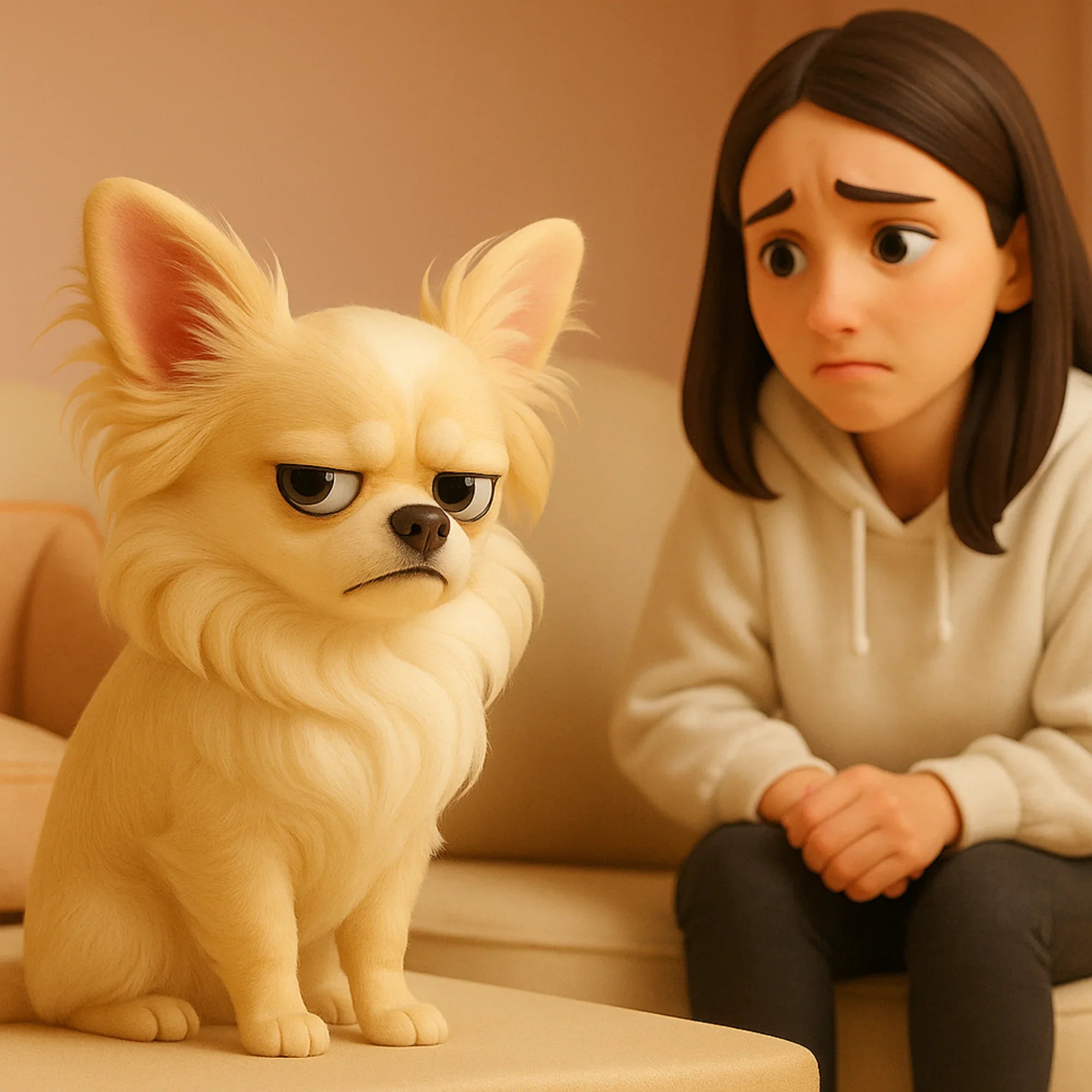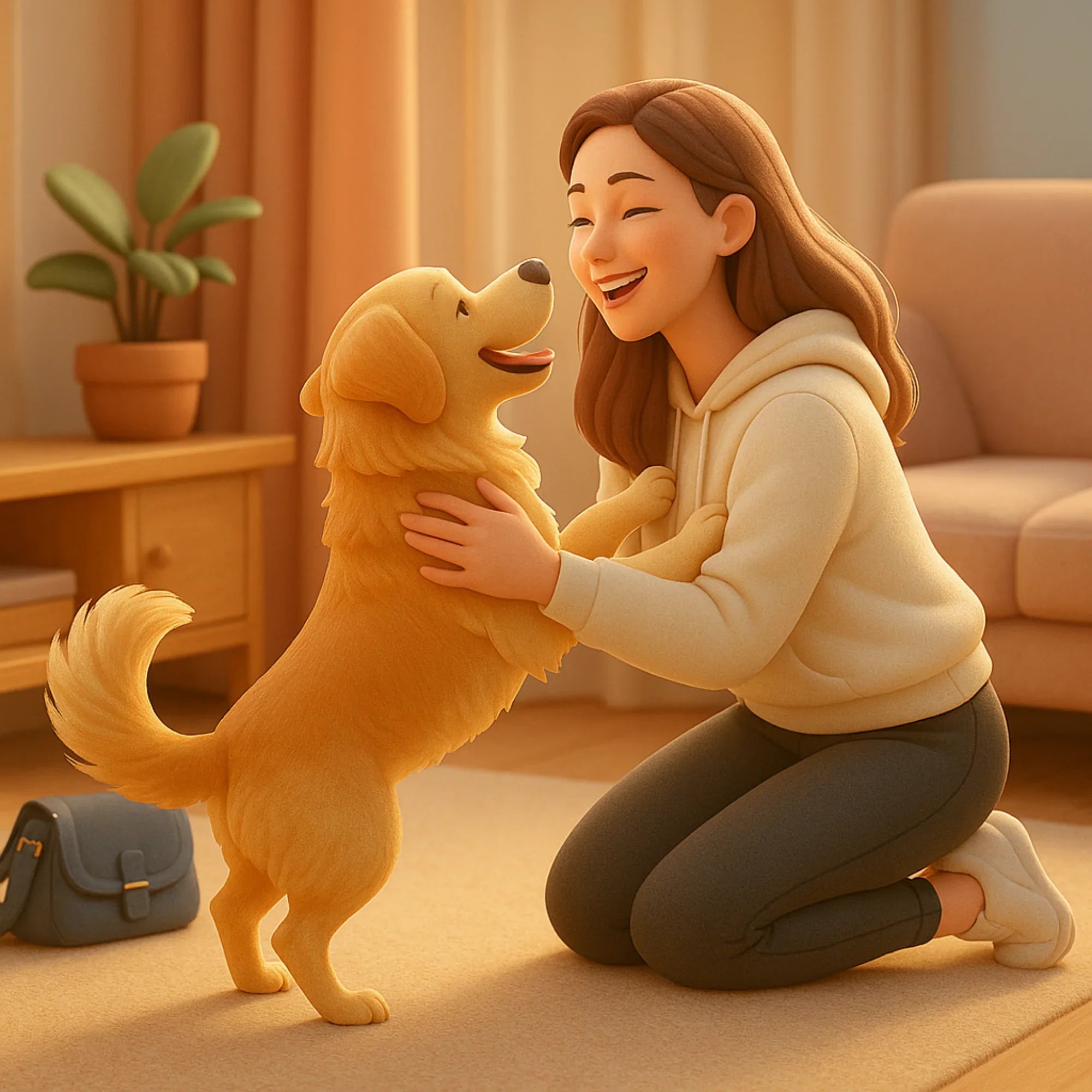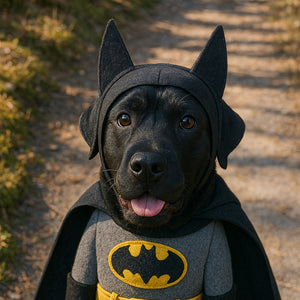
🐶 Can a dog get offended? What does a dog's "pout" really mean?
Imagine this scene: you come home after a long day, and your dog... doesn't greet you as usual. He doesn't run up to you or wag his tail. He looks sideways, turns his back, or leaves the room. "Ugh," you think, "he must be offended that I left without him."
Sound familiar? Most dog owners have had at least one experience where their pet has taken offense—at a shortened walk, at a lack of play, at not taking them with you. Dog reactions can be surprisingly expressive and... very human.
But does a dog really get offended? Is a dog's "sulking" a real thing?
This article will clear up any doubts. You'll see what's behind this behavior, what emotions a dog might be feeling, and how to react when, instead of enthusiasm, you see...ignorance.
🤔 Can a dog get offended like a human?

In a psychological sense, no. A dog doesn't have the capacity to understand the concept of "offense" the way humans do. It doesn't hold a grudge, doesn't plot revenge, doesn't experience moral disappointment. It doesn't think, "I didn't deserve it," "it was unfair"—it doesn't know that scale of judgment. But that doesn't mean it doesn't feel anything.
Dogs live in the here and now, but their emotions are real: they can feel frustration, disappointment, excitement, anxiety, and confusion. So if they don't get the walk they expected, are suddenly ignored, or their routine is disrupted, they may react with emotional withdrawal, tension, or a change in behavior .
These are the reactions we most often interpret as "pompousness." In reality, they aren't the result of an insult, but rather the dog's emotional response to a situation that is incomprehensible or uncomfortable . Moreover, such behavior can be a form of communication: the dog is saying "something's wrong," "I don't understand," or "I need a moment"—but in its own way.
🐾 5 behaviors that we often interpret as "sulking":
1. Turning your back
A dog might sit with its back to you, not look at you, or walk away when you try to call it. This is a form of distancing itself—often stemming from uncertainty, disappointment, or a need for a moment of peace. For many owners, this seems like a blatant "offense."
2. Avoiding eye contact
Instead of looking into your eyes, you avoid looking. For a dog, this is a calming strategy that can indicate mild emotional tension. It's a way of saying, "I don't know what's going on" or "I need some distance."
3. No response to commands
A normally obedient dog suddenly "can't hear"? This could be the result of emotional overload – the dog withdraws, its nervous system goes into passive mode. Instead of disobedience, it's a signal: "I'm lost, I don't know what's expected of me."
4. Isolating yourself
A dog that usually stays close by suddenly wanders into another room or lies down in a corner. This behavior may be an expression of self-regulation. Give him time—it's his way of coping with stress.
5. Reluctance to play or interact
When your dog suddenly doesn't want to play or be petted, it doesn't mean they're "punishing" you. It's usually a sign of low mood—something has disappointed, discouraged, or emotionally burdened them.
📊 Does it depend on the breed?
Yes, a dog's temperament, emotional needs, and how it reacts to disappointment can be partially determined by breed. Some dogs are more expressive, others introverted, and still others are sensitive to subtle changes in human behavior.
Breeds that are particularly emotionally sensitive:
- Border Collies – highly intelligent, quick learners, but also easily frustrated. They often react emotionally to changes and lack of interaction.
- Australian Shepherd – strongly bonded to its owner, may feel “disrespected” when the routine is disrupted.
- The Papillon , though tiny, is incredibly alert. It reacts emotionally to everything happening around it.
- Labrador Retrievers are gentle but very social. Changes in their owner's attention can cause sadness.
More independent races:
- Shiba Inu or Basenji – they can isolate themselves better, they do not necessarily seek closeness in emotional moments.
Of course, every dog is an individual, but knowing breed tendencies can help you understand why one dog gets angry after a few minutes of being alone, while another sleeps peacefully in another room for half the day .
Behaviors we interpret as "sulking" often express a spectrum of emotions. A dog who withdraws doesn't stop loving us—he's simply feeling emotional discomfort and trying to cope.
- Disappointment – Your dog may have been waiting for a walk, for you to return, or for you to play with them. When this doesn't happen, they may feel let down – even if they don't understand the reasons.
- Tension and anxiety – dogs react very strongly to changes: in your behavior, your schedule, your tone of voice. Sometimes, a change in routine is enough to make a dog feel uneasy.
- Frustration – the inability to meet needs (movement, contact, exploration) can lead to emotional overload.
- Uncertainty and confusion – a dog may feel disoriented if the situation was unclear and the handler’s reaction was difficult to predict.
- The need for self-regulation – just like humans, some dogs simply need a moment of silence and distance to allow their emotions to subside.
This isn't "taking offense"—it's a genuine emotional response that plays an important role in a dog's well-being. Understanding it helps build a deeper bond and avoid misunderstandings in the human-dog relationship.
❤️ How to support your dog in such moments?
In these moments, your dog doesn't need correction, commands, or amusement—he needs understanding and space to experience his emotions . This is the moment when you can build a deeper bond with him, demonstrating that you are a stable and safe leader.
-
Do not ridicule or dismiss your dog's behavior.
This isn't a game or manipulation. This is a real emotion that deserves attention. -
Don't push.
Don't force your dog into contact if he's withdrawing. Instead, be there, calm, and present. -
Offer a safety ritual.
A consistent feeding time, gentle words, the familiar smell of a toy – all of these can act as an emotional anchor. -
Suggest a no-pressure activity.
Go for a leisurely walk. Let your dog sniff around and explore at his own pace. It's a way to relieve stress. -
Give choice and the ability to decide.
Let him decide when to return and when to approach. Dogs who influence their environment feel more confident. -
Create routine and predictability.
Daily stability is the foundation of a dog's safety. The less chaos, the fewer emotional outbursts. -
Reward returns to balance.
When your dog approaches you on his own, when he relaxes, acknowledge his approach with a calm voice, a light touch, or praise. This builds positive associations with closeness.
Your patience and attentiveness can speak louder than a thousand words. After all, a dog's love isn't just expressed in a wagging tail—it's also expressed in trusting you enough to experience emotions with you.**
Variation can be disorienting. Dogs love repetition.
⚠️ When is it not just a sulk anymore?
Sometimes, "pompous" behavior isn't a temporary emotional reaction, but a symptom of a deeper health or emotional problem . If you notice:
- the dog avoids contact for many days,
- does not respond to your attempts at interaction , even calm and familiar ones,
- has a decrease in appetite or a sudden change in eating habits ,
- stops enjoying familiar activities (walking, playing, petting),
- often isolates himself , sleeps more than usual, looks subdued,
…then don't ignore these signs. They may indicate:
- dog depression (yes, it exists!),
- chronic stress ,
- physical pain or illness ,
- separation anxiety or excessive attachment,
- overstimulation and fatigue of the nervous system .
In such cases, it is worth:
- Consult your veterinarian to rule out health problems.
- Make an appointment with a behaviorist who will help you identify the emotional source of the problem.
- Start keeping a diary of your dog's behavior – write down when changes occur, what precedes them, and how long they last.
The quicker you react, the easier it is to help your dog regain balance and prevent the problem from getting worse. A "sulking" that lasts too long can be a cry for help .
📷 What does a dog feel when he ignores you?
From a human perspective, ignoring someone might seem like a demonstrative act, but for a dog, it's something entirely different. It's their way of regulating emotions, processing stimuli, or expressing a need for distance.
Imagine what's going on in a dog's head:
"I don't understand why we didn't go for a walk at the usual time today. I wanted to go, I waited... But nothing happened. I feel tense. Maybe I'll lie down in the corner. I don't know if I did something wrong. I'd rather not approach. I'll wait."
A dog who ignores often doesn't know how to behave, so it chooses the safest strategy: withdrawal . This isn't punishment. It's a signal: "I don't know what's going on, but I'm trying to deal with it my way."
Understanding this allows you to respond empathetically – not impulsively.
❓ FAQ – Frequently asked questions about dog pouting
🤷♂️ Does a dog really get offended?
Not in the human sense. Dogs don't hold grudges, but they can feel frustration, disappointment, and tension—and express it through withdrawal.
⏳ How long can a dog hold a sulk?
Most dogs recover within a few minutes to a few hours if they feel safe and noticed. Longer periods may indicate a more serious problem.
🐕 Are some breeds more likely to take offense?
Yes – for example, Border Collies, Australian Shepherds, Papillons and Labradors are more emotional and sensitive to changes in their owner’s behavior.
😔 Will my dog get offended if I leave him at home?
The dog may be disappointed or have separation anxiety. He may be colder upon returning – but this is an emotional response, not punishment.
❌ Should I ignore the “sulking” to avoid reinforcing the behavior?
No. Ignoring your dog's emotions can make the problem worse. Instead, respond calmly and empathetically, but without pressure.
🧠 Summary
Dogs don't get offended like humans do. But what we call a "sulk" is often a silent cry for understanding, calm, and attention . Our dogs don't need us to explain the world to them with words—they need us to be present, patient, and attentive.
Behaviors like turning your back, avoiding contact, or not responding to commands shouldn't be ignored or ridiculed. These are important emotional signals—indicating unmet needs. Instead of taking them personally, treat them as an opportunity to build a deeper connection.
Understanding and empathizing with your dog's emotions isn't just a sign of caring—it's an investment in your pet's well-being. Because every dog deserves to be seen, heard, and treated with respect.
When your dog is "pouting," stop. Look at what's changed. Instead of reacting impulsively, show support. Because behind every glance lies something more than a whim—it's a dog trying to cope with something and trusting you to help them.
🌐 Scientific sources and research
- Dogs functionally respond to and use emotional information from human expressions – Cambridge.org
- Behavioral indicators of emotional states in dogs – ScienceDirect
- Dogs recognize human emotions and respond appropriately – Cambridge PDF
- Dogs can smell when humans are stressed – University of Bristol
- Facial Expressions of Dogs as Indicators of Emotion – MDPI Animals
📚 Additional materials
- How to Tell If Your Dog Is Bored: 10 Signs You Can't Ignore
-
TOP 10 Most Intelligent Dog Breeds – Which Ones Will Surprise You With Their Cleverness?
- 🏙️ Best dogs for apartments – breed ranking
- 💬 How Do Dogs Show Affection? Signals You Should Know
- 🐕 Is your dog pulling on the leash? Find out how to fix it.
- 🚗 How to safely transport a dog in a car?
- 🐾 How to teach your dog to stay home alone
- 🛏️ Can a dog sleep in bed with its owner? Facts, myths, and behavioral advice.
See more at: Petto.com.pl
























 https://petto.com.pl
https://petto.com.pl